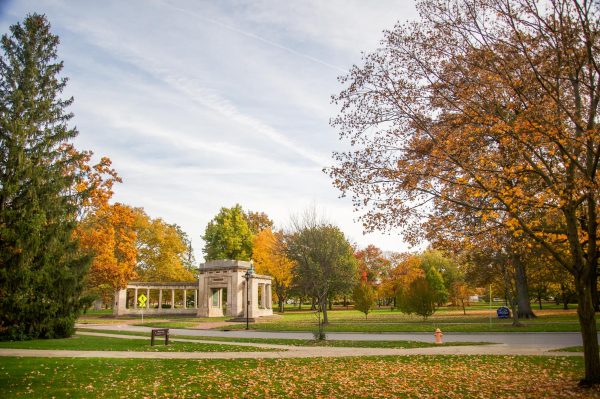Communication, Coalition-Building Among Student Senate’s Priorities
This article is part of the Review’s Student Senate column. In an effort to increase communication and transparency, Student Senators will provide personal perspectives on recent events on campus and in the community.
This weekend, while many Obies frolicked at the Arb, listened to sweet croonings at the J-House Garden show, and ventured out to Lake Erie, your loyal senators logged more than 18 hours working tirelessly for the benefit of the student body. Besides drinking frenetically from small juice boxes to fuel our brainstorming, what did we do? Well, the answer is as thrilling as it is tedious: We developed exciting plans, including drastically overhauling Senate’s systems of communication and coalition-building with other universities in our mutual fight for justice under the Trump administration.
The weekend, as they all are, was split into two days. On Saturday, we focused mainly on improving interpersonal communication among senators, team-building, and setting our goals for the semester. The following day was spent plotting out timelines and accountability measures for meeting those goals.
Crafted by Vice Chair Kameron Dunbar and facilitated by Associate Dean Dana Hamdan, the retreat was well-balanced between Saturday’s vulnerability and honesty and Sunday’s hard-line goal-setting. By the end of the weekend, I felt a new energy rising, one of a powerful generation of senators who work as hard as they talk. It was enough to keep me from resenting being trapped indoors while it was so beautiful outside, and left Senator Kirsten Mojziszek shouting, “I love Senate.”
As one of the two new Senate communications directors, along with Meg Parker, I found formulating our new plans for better communication to be especially exciting. By the end of November, Student Senate will have increased its web presence with the addition of a fresh, easily-navigable website, a well-attended-to Facebook page, and a Senate Instagram for students to connect more personally with all of our senators.
It’s easy to scoff at social media as merely a millennial dream for connecting with different constituencies, but the majority of other progressive student governments in our country speak to the students they serve through the internet. It’s only apt that Oberlin’s Senate rises to that challenge. On our website, you will be able to find archives of our weekly emails, updates from our working groups, plenary minutes, our column in The Oberlin Review, and more. Our Facebook will aim to not only signal-boost important student announcements and petitions, but also center student activism and voices fighting for institutional change. Our Instagram presence also has real potential to introduce students to the senators best-aligned with their politics and causes.
Another one of Senate’s goals for the semester is to build stronger connections with other colleges and universities in our area. Two years ago, Senate attended the Ohio 5 Student Leadership Summit, a symposium on student government with Denison University, Kenyon College, Ohio Wesleyan University, and The College of Wooster. The initiative arose to form stronger bonds between small liberal arts colleges in Ohio and to streamline communications between their student leaders.
This fall, we’re working on creating a conference of our own and will invite student governments from other small liberal arts colleges in Ohio to Oberlin’s campus. There, we will discuss different governance structures, common and uncommon roadblocks, and what we’re all doing to unite students in the fight for civil rights under the current presidential administration.
But that’s not all. Our coalition-building will reach further than just the Midwest — expect to hear back soon about our conference calls with student leaders at Princeton, Brown, the University of California, Berkeley, and other progressive institutions with values similar to those of Oberlin’s. We’re harnessing Oberlin’s national political capital to form tangible relationships with other leaders, and we know that we’ll be stronger than ever in maintaining these alliances.
By the end of plenary Sunday night, our faces were streaked with chocolate residue from the tiny Snickers bars we’d consumed, and our fingers were raw from frantically scribbling notes of direct response, as we have a new no-laptop policy.
This is the Senate I love to see: a body sore from good work and limber enough to continue it.




